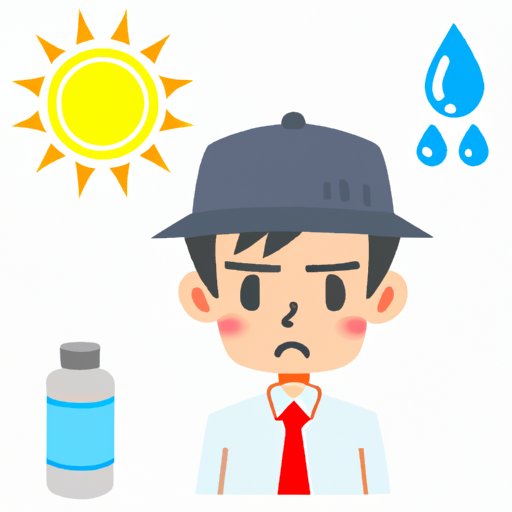I. Introduction
Summer brings sunshine, vacations, and—unfortunately—intense heat. High temperatures can lead to heat-induced fatigue, a debilitating condition that can affect your productivity, focus, and overall well-being. Heat is not just an inconvenience; it can have a profound impact on both your body and mind. In this article, we will explore the science behind heat fatigue and offer tips for staying alert and productive in hot weather.
II. The Science Behind Heat Fatigue
Heat fatigue is a physiological response to excessive heat exposure. Symptoms may include weakness, dizziness, confusion, and exhaustion. As the body tries to cool itself through sweating and vasodilation (widening of blood vessels), a cascade of hormonal and biological changes occurs in response to heat stress.1
One of the primary mechanisms behind heat-induced fatigue is the depletion of energy resources in the body. When the body is exposed to high temperatures, metabolic rate increases, which causes the body to burn more energy than it typically would. This results in reduced energy levels, which can lead to physical and mental exhaustion.2
III. How Heat Affects Energy Levels and Productivity
Heat not only affects the body’s physiology but also its psychology. Studies have shown that high temperatures can impair cognitive function, including memory, attention span, and decision-making.3 Additionally, heat can reduce physical performance and productivity, leading to decreased work quality and efficiency.4
One of the most significant psychological effects of heat on the brain is mental fatigue, which can manifest as feelings of lethargy, sleepiness, and reduced motivation. The body’s internal temperature directly affects mental alertness, with higher heat levels leading to greater cognitive impairment.5
IV. Complex Causes of Heat-Induced Fatigue
Dehydration is a significant contributor to heat-induced fatigue. When the body loses too much water through sweating, blood volume decreases, leading to a decrease in blood pressure and cardiac output.6 Additionally, hormonal changes occur in response to heat stress, including increased secretion of cortisol, which can negatively affect energy levels and mood.7
Some medications and health conditions can increase the risk of heat exhaustion, which can exacerbate symptoms of heat fatigue. Individuals who take medications that affect fluid balance, such as diuretics, or have pre-existing health conditions that affect thermoregulation, such as diabetes or heart disease, should take extra precautions to avoid heat stress.8
V. Beat the Heat: Tips for Staying Alert and Productive
Fortunately, there are several effective ways to beat the heat and stay productive in hot weather. First and foremost, it is essential to stay cool and hydrated. This means drinking plenty of water throughout the day and avoiding drinks that dehydrate, such as alcohol and caffeine.9
Other practical tips for staying alert and productive in the heat include taking regular breaks in cool environments, keeping workspaces well-ventilated, and using cooling devices such as fans or air conditioning.10
VI. The Role of Internal and External Factors in Heat Fatigue
The interplay between environmental factors and individual physiology plays a significant role in heat fatigue. Factors such as age, weight, and overall health can affect an individual’s heat tolerance and susceptibility to heat-induced fatigue.11 Additionally, external factors such as humidity, wind speed, and sunlight exposure can all contribute to heat stress and affect energy levels and productivity.12
Being aware of your individual risk factors and taking steps to mitigate them can go a long way in preventing heat-induced fatigue and maintaining productivity and well-being in hot weather conditions.
VII. Conclusion
Heat fatigue is a real and often underestimated danger of hot weather. The science behind heat stress and the interplay between internal and external factors can help individuals better understand the condition and take steps to prevent it.
By staying cool, hydrated, and taking necessary precautions, individuals can mitigate the effects of heat exhaustion and stay alert and productive during the summer months.
Do not let heat fatigue get in the way of your summer plans. Take control of your energy levels and enjoy a safe and comfortable summer season.
